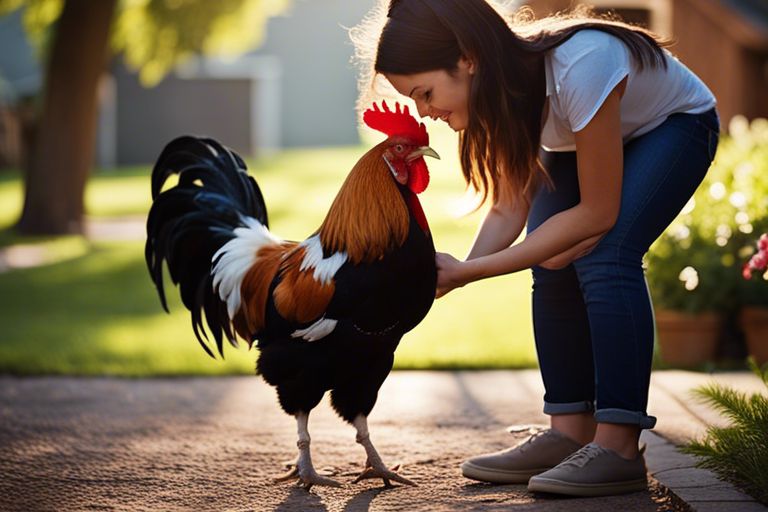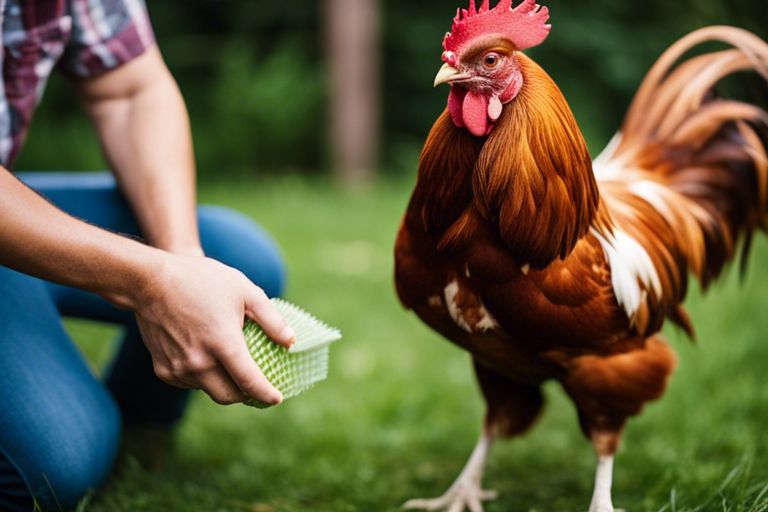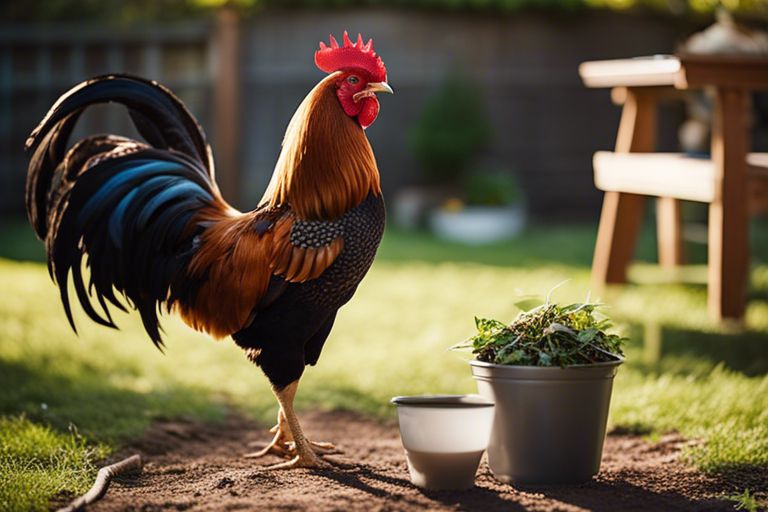Over the years, roosters have become popular additions to backyard flocks for their beauty, protection, and crowing. Caring for roosters requires a deep understanding of their needs and behaviors to keep them healthy and happy. In this comprehensive guide, we will cover everything you need to know about providing proper care for your roosters, including feeding, housing, health, and behavior. By following these necessary tips and advice, you can ensure that your roosters lead a fulfilling and content life in your care.

Understanding Rooster Behavior
Recognizing Rooster Social Dynamics
To properly care for roosters, it is imperative to understand their social dynamics within a flock. Roosters have a hierarchical structure where each bird has a specific place in the pecking order. Dominant roosters will often assert their authority over subordinate ones by pecking order or displaying aggressive behavior. It is crucial to observe their interactions to ensure harmony within the flock.
Communication: The Language of Roosters
If you listen closely, you can decipher the language of roosters through their vocalizations and body language. Roosters have various sounds they use to communicate with each other and with their human caretakers. They may crow to establish territory, alert others to danger, or attract hens. Understanding their communication cues can help you anticipate their needs and ensure a peaceful environment for your roosters.
Understanding rooster behavior is imperative for any poultry enthusiast. By recognizing their social dynamics and interpreting their unique language, you can effectively care for and nurture your roosters. Observing their interactions and communication will not only help you understand their needs better but also deepen the bond between you and your feathered friends.
Types of Roosters
Assuming you are considering adding a rooster to your flock, it’s important to be aware of the different types available. Roosters can vary in size, temperament, and purpose, so choosing the right one for your specific needs is crucial. Any reputable breeder or farm supply store should be able to provide you with information on the various types of roosters available.
| Americauna | Known for its colorful eggs and friendly nature |
| Rhode Island Red | Excellent foragers and good egg producers |
| Leghorn | Great egg layers but can be more skittish |
| Wyandotte | Beautiful plumage and good meat quality |
| Orpington | Friendly and docile with good meat quality |
Popular Breeds and Their Characteristics
With a variety of rooster breeds to choose from, it’s crucial to consider their characteristics before making a decision. For example, the Americauna is known for its colorful eggs and friendly nature, while the Rhode Island Red is an excellent forager and good egg producer. Understanding the different breeds will help you select the right rooster for your flock.
Choosing the Right Rooster for Your Flock
Even though all roosters have the same basic purpose of protecting the flock and fertilizing eggs, it’s important to choose one that fits well with your existing hens. Consider the size of your flock, the temperament of your hens, and your own preferences when selecting a rooster. A good match will lead to a harmonious and productive flock.
The Essentials of Rooster Care
Housing: Creating a Safe and Comfortable Environment
Not only does proper housing keep your roosters safe from predators and the elements, but it also ensures they have a comfortable living space. Make sure their coop is spacious enough to allow them to move around freely, with perches for roosting and nesting boxes for laying eggs. Regularly clean the coop to prevent the buildup of droppings and parasites, and provide fresh bedding for their comfort.
Nutrition: Feeding Your Rooster Correctly
Your rooster’s diet plays a crucial role in their overall health and well-being. Provide them with a balanced feed specifically formulated for roosters, which typically includes a mix of grains, seeds, and necessary vitamins and minerals. Additionally, ensure they have access to fresh water at all times to prevent dehydration and aid in digestion.
Understanding the nutritional requirements of your rooster is important for their growth, vitality, and reproductive health. Consult with a veterinarian or poultry expert to determine the best feeding regimen for your specific breed and age of rooster. A diet rich in protein is especially important for roosters, as it helps support their muscle development and feather quality.

Health and Wellness
Common Health Issues and Prevention
All rooster owners should be aware of common health issues that can affect their birds and take proactive steps to prevent them. An necessary aspect of rooster care is regular health checks and observation of any changes in behavior or appearance. Some common health issues in roosters include respiratory infections, mites and lice infestations, bumblefoot, and coccidiosis. Prevention measures include maintaining clean living conditions, providing a balanced diet, regular veterinary check-ups, and practicing good biosecurity measures to prevent the spread of diseases.
Step-by-Step Guide to Rooster First Aid
One of the most crucial skills a rooster owner can have is the ability to administer first aid in case of injuries or sudden health issues. Below is a step-by-step guide to rooster first aid that can help you handle emergencies effectively:
| Step | Description |
| 1 | Assess the situation and calmly approach the rooster. |
| 2 | Restrain the rooster gently to avoid further injury. |
| 3 | Clean and disinfect the wound using antiseptic solution or saline. |
| 4 | Apply wound dressing or bandage to protect the injury. |
| 5 | Monitor the rooster closely for any signs of infection or complications. |
Common injuries that may require first aid include cuts, scrapes, puncture wounds, and leg injuries. It is necessary to have a first aid kit specifically for your rooster that includes basic supplies such as bandages, antiseptic solution, scissors, and clean cloth for wrapping wounds. Always consult a veterinarian for serious injuries or health concerns.

Day-to-Day Rooster Management
Tips for Maintaining a Peaceful Flock
Unlike hens, roosters can be more territorial and aggressive. To maintain a peaceful flock, provide enough space for each rooster to establish its territory and avoid overcrowding. Ensure they have access to food and water at all times, and consider adding hiding spots like bushes or crates to the coop to give them a sense of security. Keep an eye out for any signs of aggression and be prepared to separate roosters if necessary.
- Provide enough space for each rooster
- Ensure adequate access to food and water
- Add hiding spots for security
- Monitor and address signs of aggression promptly
After all, a peaceful flock leads to a harmonious environment for both the roosters and hens, ultimately benefiting the overall well-being of your poultry.
Handling and Training Your Rooster
Flock management includes handling and training your rooster to ensure they are well-behaved and easy to manage. When handling your rooster, approach them confidently and avoid sudden movements. Start training early using positive reinforcement techniques like treats and praise. Establish yourself as the leader through consistent training and gentle discipline to show your rooster who is in charge.
Tips for effective training include setting clear boundaries, being patient, and staying consistent with your training methods. Regular interaction and training sessions will help strengthen the bond between you and your rooster, making future handling easier for both parties.
Breeding and Fertility
Factors Affecting Rooster Fertility
Keep in mind that several factors can impact the fertility of roosters. These factors include age, nutrition, overall health, stress levels, and the quality of the hens they are breeding with. Ensuring that your roosters are in optimal condition is important for successful breeding.
- Age
- Nutrition
- Health
- Stress levels
- Quality of hens
This will ultimately affect the number of viable eggs produced and the overall success of your breeding program. It’s important to monitor these factors closely to maximize fertility rates.
Pros and Cons of Breeding Roosters
ProsCons
| Ability to produce offspring |
| Expand your flock |
| Potential for genetic improvement |
| Revenue potential through selling chicks |
| Satisfaction of raising and breeding your own birds |
| Increased risk of aggression |
| Need for additional space and resources |
| Potential for inbreeding |
| Time and effort required for care and management |
| Health risks associated with breeding |
Fertility plays a crucial role in successful breeding programs, and it is important to understand the pros and cons associated with breeding roosters. By carefully considering these factors, you can make informed decisions that will benefit your flock in the long run.
Legal and Ethical Considerations
Understanding Local Regulations
For many individuals, keeping roosters as pets or for breeding purposes can be a fulfilling experience. However, it is necessary to first understand and adhere to local regulations regarding the keeping of roosters. Some areas may have restrictions on the number of roosters allowed per property, noise ordinances related to crowing, or specific zoning requirements for keeping poultry.
Ethical Responsibilities of Keeping Roosters
On the ethical front, it is crucial for rooster owners to consider the quality of life and well-being of their feathered companions. Responsible rooster keeping includes providing proper housing, nutrition, access to fresh water, and adequate space for natural behaviors like dust bathing and roosting. Roosters should be treated with respect and care, and their welfare should always be a top priority.
Understanding the legal and ethical considerations of keeping roosters is necessary for any responsible poultry owner. By familiarizing yourself with local regulations and upholding ethical standards in care and treatment, you can ensure a safe and nurturing environment for your roosters while also promoting positive relationships with your community.
Conclusion
Now equipped with ‘The Ultimate Guide To Caring For Roosters – Everything You Need To Know’, you can confidently care for your roosters with the knowledge and expertise needed to provide a healthy and happy life for them. By understanding their dietary needs, housing requirements, health concerns, and overall behavior, you can ensure that your roosters thrive under your care. Remember to always prioritize their well-being and provide a safe and enriching environment for them to flourish. With this guide, you are well-prepared to be a responsible and knowledgeable rooster owner.
FAQ
Q: Why is it important to care for roosters properly?
A: Proper care for roosters is crucial to ensure their health, well-being, and longevity. Neglecting their care can lead to various health issues and behavioral problems.
Q: What should a balanced diet for roosters consist of?
A: A balanced diet for roosters should include a combination of high-quality poultry feed, grains, greens, fruits, and access to clean water. Protein-rich foods are crucial for their growth and development.
Q: How can I provide adequate shelter for my roosters?
A: Roosters should have a secure and comfortable coop that offers protection from predators, extreme weather conditions, and adequate ventilation. Provide enough space for them to move around and roost comfortably.
Q: What are some common health issues that roosters may face?
A: Roosters are susceptible to various health issues such as respiratory infections, parasites, and injuries. Regular health checks, proper nutrition, and a clean environment can help prevent these issues.
Q: How should I handle aggression in roosters?
A: Aggression in roosters is a common behavior that can be managed through proper socialization, training, and providing adequate space. Avoid escalating conflicts and seek professional advice if aggression persists.
Q: How often should I clean the coop and nesting areas?
A: It is recommended to clean the coop and nesting areas at least once a week to prevent the buildup of dirt, droppings, and parasites. Regular cleaning helps maintain a healthy environment for your roosters.
Q: What are some signs that indicate a rooster is in distress or unwell?
A: Signs of distress or illness in roosters include lethargy, loss of appetite, abnormal droppings, respiratory issues, and changes in behavior. It is important to monitor your roosters closely and consult a veterinarian if you notice any concerning symptoms.











